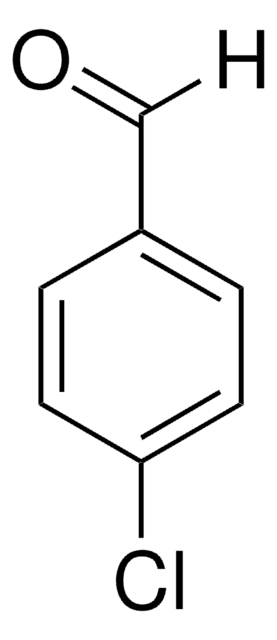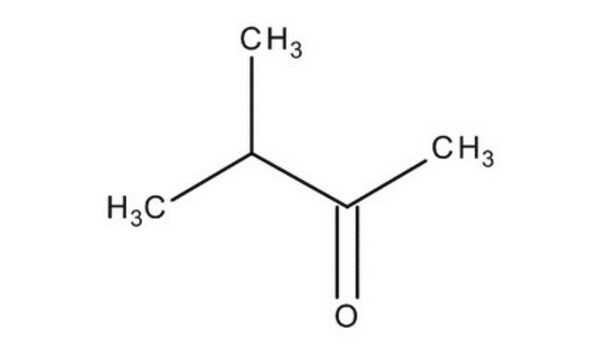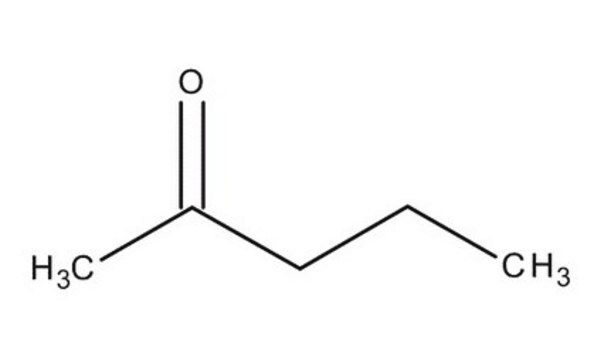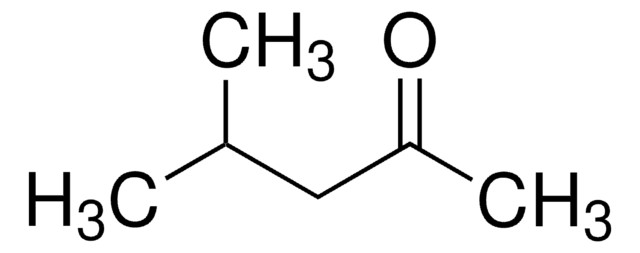8.03605
Diethyl ketone
for synthesis
Sinonimo/i:
Diethyl ketone, 3-Pentanone, Ethyl ketone
About This Item
Prodotti consigliati
Grado
for synthesis
synthesis grade
Livello qualitativo
Tensione di vapore
37.6 hPa ( 20 °C)
Saggio
≥99% (GC)
Stato
liquid
Temp. autoaccensione
425 °C
Potenza
2900 mg/kg LD50, oral (Rat)
16200 mg/kg LD50, skin (Rabbit)
Limite di esplosione
1.6-7.7 % (v/v)
dilution
(for synthesis)
pH
6.2 (20 °C, 50 g/L in H2O)
P. ebollizione
101-103 °C/1013 mbar
Punto di fusione
-40 °C
Temp. transizione
flash point 7 °C
Solubilità
50 g/L
Densità
0.81 g/cm3 at 20 °C
Temperatura di conservazione
2-30°C
Stringa SMILE
O=C(CC)CC
InChI
1S/C5H10O/c1-3-5(6)4-2/h3-4H2,1-2H3
FDPIMTJIUBPUKL-UHFFFAOYSA-N
Applicazioni
- Resonance Stabilization Effects on Ketone Autoxidation: Isomer-Specific Cyclic Ether and Ketohydroperoxide Formation in the Low-Temperature (400-625 K) Oxidation of Diethyl Ketone.: This study examines the low-temperature oxidation of diethyl ketone, highlighting how resonance stabilization influences the formation of specific cyclic ethers and ketohydroperoxides, vital for understanding combustion mechanisms and environmental implications of ketone use in industrial applications (Scheer AM et al., 2016).
- Low-temperature combustion chemistry of novel biofuels: resonance-stabilized QOOH in the oxidation of diethyl ketone.: This research focuses on the combustion chemistry of diethyl ketone as a biofuel, providing insights into the formation of resonance-stabilized QOOH intermediates which are crucial for developing more efficient and cleaner burning fuels (Scheer AM et al., 2014).
- Wet effluent diffusion denuder technique and determination of volatile organic compounds in air. I. Oxo compounds (alcohols and ketones).: Explores the use of diethyl ketone in air quality monitoring, employing a novel wet effluent diffusion denuder technique for the sensitive detection of oxo compounds, vital for environmental monitoring and regulatory compliance (Pesková J et al., 2001).
- Identification limits for volatile organic compounds in the blood by purge-and-trap GC-FTIR.: Discusses the detection limits of volatile organic compounds, including diethyl ketone, in blood using advanced purge-and-trap gas chromatography coupled with Fourier-transform infrared spectroscopy, emphasizing its importance in forensic and toxicological analyses (Ojanperä I et al., 1998).
Risultati analitici
Density (d 20 °C/ 4 °C): 0.813 - 0.815
Identity (IR): passes test
Avvertenze
Danger
Indicazioni di pericolo
Consigli di prudenza
Classi di pericolo
Eye Irrit. 2 - Flam. Liq. 2
Rischi supp
Codice della classe di stoccaggio
3 - Flammable liquids
Classe di pericolosità dell'acqua (WGK)
WGK 1
Punto d’infiammabilità (°F)
44.6 °F
Punto d’infiammabilità (°C)
7 °C
Certificati d'analisi (COA)
Cerca il Certificati d'analisi (COA) digitando il numero di lotto/batch corrispondente. I numeri di lotto o di batch sono stampati sull'etichetta dei prodotti dopo la parola ‘Lotto’ o ‘Batch’.
Possiedi già questo prodotto?
I documenti relativi ai prodotti acquistati recentemente sono disponibili nell’Archivio dei documenti.
I clienti hanno visto anche
Il team dei nostri ricercatori vanta grande esperienza in tutte le aree della ricerca quali Life Science, scienza dei materiali, sintesi chimica, cromatografia, discipline analitiche, ecc..
Contatta l'Assistenza Tecnica.











